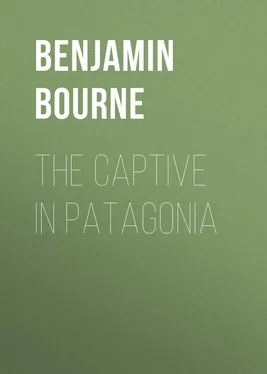Benjamin Bourne - The Captive in Patagonia
Здесь есть возможность читать онлайн «Benjamin Bourne - The Captive in Patagonia» — ознакомительный отрывок электронной книги совершенно бесплатно, а после прочтения отрывка купить полную версию. В некоторых случаях можно слушать аудио, скачать через торрент в формате fb2 и присутствует краткое содержание. Жанр: foreign_antique, foreign_prose, на английском языке. Описание произведения, (предисловие) а так же отзывы посетителей доступны на портале библиотеки ЛибКат.
- Название:The Captive in Patagonia
- Автор:
- Жанр:
- Год:неизвестен
- ISBN:нет данных
- Рейтинг книги:4 / 5. Голосов: 1
-
Избранное:Добавить в избранное
- Отзывы:
-
Ваша оценка:
- 80
- 1
- 2
- 3
- 4
- 5
The Captive in Patagonia: краткое содержание, описание и аннотация
Предлагаем к чтению аннотацию, описание, краткое содержание или предисловие (зависит от того, что написал сам автор книги «The Captive in Patagonia»). Если вы не нашли необходимую информацию о книге — напишите в комментариях, мы постараемся отыскать её.
The Captive in Patagonia — читать онлайн ознакомительный отрывок
Ниже представлен текст книги, разбитый по страницам. Система сохранения места последней прочитанной страницы, позволяет с удобством читать онлайн бесплатно книгу «The Captive in Patagonia», без необходимости каждый раз заново искать на чём Вы остановились. Поставьте закладку, и сможете в любой момент перейти на страницу, на которой закончили чтение.
Интервал:
Закладка:
With this final death-blow to all present hopes of relief, I turned away in despair. Exhausted by hunger, cold and fatigue, and worn out by hours of anxiety, I fell helpless upon the ground, and wept like a child. For the first time I felt utterly forsaken, and repined at my lot as one of unmitigated evil. Effort seemed useless; I had neither resolution nor strength to make further exertion. There was nothing for me but listless endurance. I even reproached myself that I had not cast myself into the sea, and staked my life on the chance of swimming to the schooner. There was no possibility of doing this; but failure would have been only death, and what was life worth to me here? This tempest of self-reproach soon spent itself. My temperament is too buoyant to be long depressed, and calm and stout thoughts took the place of despairing weakness. It was unmanly, something whispered within me, thus to give way before difficulties. It would be time enough to do this when all possible effort had failed. The weak and imbecile might take refuge in despair, but the strength of youth should serve me better. I called to mind examples of courage in greater emergencies, when obstacles that seemed insurmountable had been conquered by fortitude and perseverance. “Heaven helps those who help themselves.” The more I reflected on the matter, the stronger grew the impulses of faith and courage, by whose force it seemed possible to win a triumph against the greatest odds. Before rising from the earth, my resolution was fully taken to throw discouragement to the winds; by the help of God to meet whatever impended with the courage of a man; to bear my calamities with patient endurance; and to give up hope and energy only when nothing was left to be attempted, or the power to do and suffer was exhausted.
I rose a new man, – my strength invigorated, my soul fortified by a strong purpose. Though the cold night air had thoroughly chilled my frame, it now felt a warmth kindled by the fires within, and an unaccustomed flush suffused my countenance. The resolve fixed in this memorable crisis of my captivity, though severely tested, was never wholly overborne. Henceforth, the events and scenes through which I passed were viewed with a calmness that had been before unattainable, and which is now scarcely credible, on recollection. So true is it that our strength is unknown to ourselves till it is thoroughly tested.
The hope of immediate release, however, was at an end; my savage captors, it seemed, must be looked upon as for an indefinite period my masters and companions; and I had nothing at present to do but to divert myself by a study of their manners and habits; to consult my safety by a close study of their character, and of the ways and means by which so to adapt my deportment to it as to win their confidence, to disarm hostility, and to seize opportunities.
Patagonia, as it offered itself to my observation, more than answered the descriptions of geographers, – bleak, barren, desolate, beyond description or conception, – only to be appreciated by being seen. Viewed from the Straits of Magellan, it rises in gentle undulations or terraces. Far as the eye can reach, in a westerly direction, it assumes a more broken and hilly appearance, and long ranges of mountains, extending from north to south, divide the eastern from the western shore. The soil is of a light, sandy character, and bears nothing worthy the name of a tree. Low bushes, or underwood, are tolerably abundant, and in the valleys a coarse, wiry grass grows luxuriantly. Streams of water are rare. The natives draw their supplies principally from springs or pools in the valleys, the water of which is generally brackish and disagreeable.
The variety of animal is nearly as limited as that of vegetable productions. The guanaco, a quadruped allied to the lama, and with some resemblance to the camelopard, is found in considerable numbers. It is larger than the red deer, fleet on the foot, usually found in large herds, frequenting not only the plains, but found along the course of the Andes. Its flesh is a principal article of food; its skin is dried with the hair on, in such a manner that, when wet, it retains its pliability and softness. This process of preserving skins seems to be peculiar to the Indian tribes, and is not unlike that by which buffalo-robes, bear-skins, buckskins, and other articles of luxury, and even necessity, among us, are prepared by the North American Indians. Guanaco-skins are cut into pieces of all sizes, and sewed into a thousand fanciful patterns, every workman originating a style to suit himself. The hoofs are sometimes turned to account by the natives as soles for shoes, when they indulge in such a luxury, which is not often.
The enemy of the guanaco is the cougar, or “American lion,” smaller than its African namesake, and more resembling the tiger in his character and habits, having a smooth, sleek coat, of a brownish yellow color, – altogether a very beautiful but ferocious creature. His chase is a favorite, though rare and dangerous, sport of the natives. Patagonia likewise boasts of the skunk, whose flesh is used for food. There are also foxes, and innumerable mice. Of birds, the only noticeable varieties are the condor, in the Andes, and the cassowary, a species of ostrich, smaller than that of Africa, on the plains; its plumage is not abundant, generally of a gray or dun color. Its flesh is tender and sweet, and with the fat much prized by the Indians. Like the African ostrich, it is exceedingly swift, only to be captured on horseback, and often fleet enough to outrun the fastest racer.
The climate is severe. The Rio Negro forms the northern boundary, and nearly the whole country is south of the parallel of 40° south latitude. At the time of my capture, which was in the month of May, the weather corresponded to that of November in the New England States. Its chilliness, however, was greatly increased by the bleak winds of that exposed locality. Along the Straits of Magellan the weather is also exceedingly changeable. Sudden and severe squalls, often amounting almost to a hurricane, vex the navigation of the straits, and sweep over the coast with fearful fury.
The habits of the Patagonians, or at least of the tribe among whom I was cast, are migratory, wandering over the country in quest of game, or as their caprice may prompt them. They subsist altogether on the flesh of animals and birds. The guanaco furnishes most of their food, and all their clothing. A mantle of skins, sewed with the sinews of the ostrich, fitting closely about the neck and extending below the knee, is their only article of dress, except in the coldest weather, when a kind of shoe, made of the hind hoof and a portion of the skin above it, serves to protect their inferior extremities.
In person they are large; on first sight, they appear absolutely gigantic. They are taller than any other race I have seen, though it is impossible to give any accurate description. The only standard of measurement I had was my own height, which is about five feet ten inches. I could stand very easily under the arms of many of them, and all the men were at least a head taller than myself. Their average height, I should think, is nearly six and a half feet, and there were specimens that could have been little less than seven feet high. They have broad shoulders, full and well-developed chests, frames muscular and finely proportioned, the whole figure and air making an impression like that which the first view of the sons of Anak is recorded to have made on the children of Israel. They exhibit enormous strength, whenever they are sufficiently aroused to shake off their constitutional laziness and exert it. They have large heads, high cheek-bones, like the North American Indians, whom they also resemble in their complexion, though it is a shade or two darker. Their foreheads are broad, but low, the hair covering them nearly to the eyes; eyes full, generally black, or of a dark brown, and brilliant, though expressive of but little intelligence. Thick, coarse, and stiff hair protects the head, its abundance making any artificial covering superfluous. It is worn long, generally divided at the neck, so as to hang in two folds over the shoulders and back, but is sometimes bound above the temples, by a fillet, over which it flows in ample luxuriance. Like more civilized people, the Patagonians take great pride in the proper disposition and effective display of their hair. Their teeth are really beautiful, sound and white, – about the only attractive and enviable feature of their persons. Feet and hands are large, but not disproportionate to their total bulk. They have deep, heavy voices, and speak in guttural tones, – the worst guttural I ever heard, – with a muttering, indistinct articulation, much as if their mouths were filled with hot pudding. Their countenances are generally stupid, but, on closer inspection, there is a gleam of low cunning that flashes through this dull mask, and is increasingly discernible on acquaintance with them; when excited, or engaged in any earnest business that calls their faculties into full exercise, their features light up with unexpected intelligence and animation. In fact, as one becomes familiar with them, he will not fail to detect an habitual expression of “secretiveness” and duplicity, which he will wonder he did not observe sooner. They are almost as imitative as monkeys, and are all great liars; falsehood is universal and inveterate with men, women and children. The youngest seem to inherit the taint, and vie with the oldest in displaying it. The detection of a falsehood gives them no shame or uneasiness. To these traits should be added a thorough-paced treachery, and, what might seem rather inconsistent with their other qualities, a large share of vanity, and an immoderate love of praise. They are excessively filthy in their personal habits. Hydrophobia, so to speak, is a prevailing distemper; they never wash themselves. Hands and faces are covered with dirt, so thick, and of such ancient deposit, that their natural color only appears in spots, laid bare by the mechanical loosening and displacement of some of the strata, which curiously variegates the surface. It is hardly necessary to remark that such a condition of the skin is highly favorable to the increase and multiplication of “the moving creature that hath life,” wherewith their persons are abundantly peopled.
Читать дальшеИнтервал:
Закладка:
Похожие книги на «The Captive in Patagonia»
Представляем Вашему вниманию похожие книги на «The Captive in Patagonia» списком для выбора. Мы отобрали схожую по названию и смыслу литературу в надежде предоставить читателям больше вариантов отыскать новые, интересные, ещё непрочитанные произведения.
Обсуждение, отзывы о книге «The Captive in Patagonia» и просто собственные мнения читателей. Оставьте ваши комментарии, напишите, что Вы думаете о произведении, его смысле или главных героях. Укажите что конкретно понравилось, а что нет, и почему Вы так считаете.












